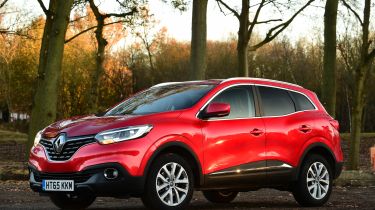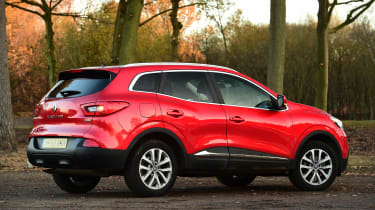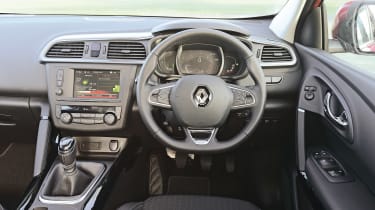Used Renault Kadjar (Mk1, 2015-date) review
A full used buyer’s guide on the Renault Kadjar covering the Kadjar Mk1 that went on sale in 2015
Verdict
Renault was slow to launch its first mid-sized SUV, but the Kadjar was worth waiting for. It was our Crossover of the Year at launch and this was backed up by impressive Driver Power scores. When we ran a Kadjar dCi for 10 months and 22,000 miles we quickly warmed to its 52mpg economy, refinement, comfort and spacious cabin, but with the all-new Renault Austral on sale next year, the gloss has worn off its predecessor a bit. That’s only natural now that the Kadjar is seven years old, but running costs should still be low and comfort levels high. Just be sure to check that everything works before buying – especially all of the electronics.
Renault’s first foray into SUV production didn’t end well. Its Koleos of 2008 failed to interest buyers, but when its supermini-sized Captur was launched in 2013, it went on to become the French firm’s most popular model.
With this newfound momentum, Renault then introduced the Kadjar a couple of years later, a size up from the Captur and another car that hit the spot with its appealing design, roomy cabin and low running costs. It helped that the Kadjar was based on a car that had already proved to be a smash hit, the Nissan Qashqai, but we reckoned that the Renault was actually better than the Japanese car. Seven years after its launch, there’s still much to like about the Kadjar.
History
The Kadjar arrived in September 2015, with 128bhp 1.2 TCe petrol and 109bhp 1.5 dCi or 128bhp 1.6 dCi diesel engines, with the latter option (the dCi 130) offered in front or four-wheel-drive forms. In September 2017 a 163bhp turbocharged 1.6-litre petrol engine (the TCe 165) joined the range.
Used - available now

2022 Ford
S-Max Vignale
6,476 milesAutomaticPetrol2.5L
Cash £30,496
2021 Vauxhall
Astra Sports Tourer
41,054 milesManualPetrol1.2L
Cash £10,995
2017 Toyota
Yaris Hybrid
22,510 milesManualPetrol1.5L
Cash £11,104
2023 Ford
Focus Estate
19,162 milesManualPetrol1.0L
Cash £18,847Then in February 2019 a facelifted Kadjar reached showrooms, with refreshed styling and new petrol engines, as well as upgraded diesel units. The line-up then consisted of the 138bhp TCe 140 and 158bhp TCe 160 1.3-litre petrol engines, along with 114bhp 1.5-litre Blue dCi 115 and 148bhp 1.7-litre Blue dCi 150 diesel motors. Again, the latter came with the option of front or four-wheel drive.
From February 2022 the Kadjar range was cut to just the TCe 140 engine and two trim levels: Equilibre and Techno.
Which one should I buy?
We wouldn’t steer you away from any of the engines; none offers blistering performance but all are frugal enough. However, if you want an automatic, the EDC dual-clutch ’box is much nicer to use than the X-Tronic CVT.
Entry-level Expression+ trim is fairly spartan but has cruise control, electric windows, air-con, hill start assist and Bluetooth. Dynamique Nav adds 17-inch alloy wheels, dual-zone climate control, automatic headlights and wipers, seven-inch touchscreen infotainment and extra driver aids.
Dynamique S Nav has front and rear parking sensors, 19-inch wheels, synthetic leather trim and electric door mirrors, while Signature Nav adds LED headlights, a panoramic sunroof and an upgraded hi-fi. The range-topping Signature S Nav features a rear parking camera, leather trim and blind spot warning.
Alternatives to the Renault Kadjar
Mid-sized crossovers are very popular, so there are lots to choose from. The Nissan Qashqai shares a lot with the Kadjar and is plentiful, while the Hyundai Tucson and its cousin, the Kia Sportage, are well equipped, good value and come with long warranties.
Also related to each other are the SEAT Ateca, Skoda Karoq and Volkswagen Tiguan; they’re solidly constructed, easy to live with and come with some impressive engines, while the Mazda CX-5 is great to drive, stylish and has an impressive cabin.
The Ford Kuga is dynamically capable and well equipped, while the Peugeot 3008 is another great-looking car with an impressive interior. The Toyota RAV4 is also worth considering for its reliability, bold design and efficient hybrid powertrain.
What to look for
Battery
The alarm beeps if the battery is losing charge; the car needs driving or the battery replaced. Faulty tilt sensors also cause this.
Engine
The 1.2 TCe can use oil, so you need to check it regularly – every 1,000-2,000 miles. Some owners have had to have replacement engines.
Spare
All Kadjars come with a tyre repair kit. You can buy a space-saver spare wheel for £150, but it won’t fit if the optional Bose stereo is specified.
Key card
The button cell battery in the key card doesn’t tend to last more than two years. Don’t forget to change the one in the spare key card at the same time.
Common faults
Some Kadjar owners have complained about electronic glitches. Many of these relate to the infotainment system, which can suffer from Bluetooth and sat-nav issues. Check these are working on any used example you look at.
Interior
The fit and finish is generally very good, but until the 2019 facelift some of the switchgear placement was a bit haphazard; later cars are much better in this respect.
What has always been good is the amount of cabin space, with lots of room for three adults unless they’re taller than average. Boot space is pretty good too, at 472 litres with the seats up, which puts the Kadjar pretty much in the middle of the class.
The 2019 facelift for the Kadjar brought a better integrated infotainment system, but removed the main physical volume controls. The buttons on the steering wheel stayed in place, however.
Running costs
All Kadjars need to be serviced every 12 months or 18,000 miles. There are two levels of service: A and B, typically priced at £120 (it can vary between dealers) and £195. While the former consists of just a fresh pollen filter and various checks, the latter adds an oil and filter change. High-mileage drivers are encouraged to combine the two services for around £250.
Only the 1.5 dCi engine has a cambelt, which should be changed every five years or 60,000 miles for around £400. The coolant needs to be replaced every five years or 90,000 miles (at £89), the brake fluid after three years, then every 24 months (at £65), and the air-con should be serviced every two years at a cost of £150.
All Kadjars came with a four-year/100,000-mile guarantee, with no mileage limit for the first two years.
Recalls
Renault has recalled the Kadjar six times so far, the first in January 2016 because of a possibility of brake servo failure, but not failure of the brakes altogether.
Two campaigns were issued in April 2016, one because of the side airbags failing to deploy properly in the event of a collision, and the other because of a chance of seatbelt malfunction during a collision.
Release number four was issued in September 2017, once again because of side airbag glitches. Faulty catalytic converters were the reason behind the fifth recall in July 2020. Just two cars were affected though, having been built in October 2019.
The most recent Kadjar recall was issued in August 2020, affecting more than 45,000 cars built up to July 2018, to fix faulty child door locks.
Driver Power owner satisfaction
When the Kadjar made its Driver Power debut in the 2016 new-car poll, it went straight in at number three (out of 100). Its last appearance was in the 2020 survey, where it came 65th out of 75 models. It finished 55th in 2019, when it also achieved 59th in our used-car poll (out of 100 cars). Low running costs and cabin space/practicality are highlights, but owners are less impressed by the driving experience and overall quality.
Head over to our Find a Car service to get a great deal on a used Renault Kadjar...










